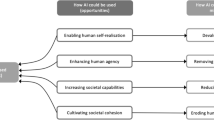Abstract
The concept of AI for Social Good(AI4SG) is gaining momentum in both information societies and the AI community. Through all the advancement of AI-based solutions, it can solve societal issues effectively. To date, however, there is only a rudimentary grasp of what constitutes AI socially beneficial in principle, what constitutes AI4SG in reality, and what are the policies and regulations needed to ensure it. This paper fills the vacuum by addressing the ethical aspects that are critical for future AI4SG efforts. Some of these characteristics are new to AI, while others have greater importance due to its usage.
Access this chapter
Tax calculation will be finalised at checkout
Purchases are for personal use only
Similar content being viewed by others
Notes
- 1.
United Nations’ Sustainable Development Goals. https://aiforgood.itu.int/about/.
- 2.
- 3.
Child Advice Chatbots Fail Sex Abuse Test https://www.bbc.com/news/technology-46507900.
References
Al-Abdulkarim, L., Atkinson, K., Bench-Capon, T.: Factors, issues and values: revisiting reasoning with cases. In: Proceedings of the 15th International Conference on Artificial Intelligence and Law, pp. 3–12 (2015)
Burns, A., Rabins, P.: Carer burden in dementia. Int. J. Geriatr. Psychiatry 15(S1), S9–S13 (2000)
Butler, D.: Ai summit aims to help world’s poorest. Nat. News 546(7657), 196 (2017)
Eicher, B., Polepeddi, L., Goel, A.: Jill Watson doesn’t care if you’re pregnant: grounding AI ethics in empirical studies. In: Proceedings of the 2018 AAAI/ACM Conference on AI, Ethics, and Society, pp. 88–94 (2018)
Fang, F., et al.: Deploying paws: field optimization of the protection assistant for wildlife security. In: Twenty-Eighth IAAI Conference (2016)
Lakkaraju, H., et al.: A machine learning framework to identify students at risk of adverse academic outcomes. In: Proceedings of the 21th ACM SIGKDD International Conference on Knowledge Discovery and Data Mining, pp. 1909–1918 (2015)
Lu, H., et al.: A mathematical-descriptor of tumor-mesoscopic-structure from computed-tomography images annotates prognostic-and molecular-phenotypes of epithelial ovarian cancer. Nat. Commun. 10(1), 1–11 (2019)
Mathur, V., Stavrakas, Y., Singh, S.: Intelligence analysis of Tay twitter bot. In: 2016 2nd International Conference on Contemporary Computing and Informatics (IC3I), pp. 231–236. IEEE (2016)
Oliver, N.: Big data for social good: opportunities and challenges. In: 12th World Telecommunication/ICT Indicators Symposium (WTIS 2014) [Date of reference 20 May 2015] (2014). http://www.itu.int/en/ITU-D/Statistics/Documents/events/wtis2014/003INF-E.pdf
Petersen, E.E., et al.: Vital signs: pregnancy-related deaths, united states, 2011–2015, and strategies for prevention, 13 states, 2013–2017. Morb. Mortal. Wkly Rep. 68(18), 423 (2019)
Tabuchi, H., Gelles, D.: Doomed boeing jets lacked 2 safety features that company sold only as extras. The New York Times, 21 March 2019
Taddeo, M., Floridi, L.: How AI can be a force for good. Science 361(6404), 751–752 (2018)
Taddeo, M., Floridi, L.: Regulate artificial intelligence to avert cyber arms race (2018)
Yadav, A., et al.: POMDPs for assisting homeless shelters – computational and deployment challenges. In: Osman, N., Sierra, C. (eds.) AAMAS 2016. LNCS (LNAI), vol. 10003, pp. 67–87. Springer, Cham (2016). https://doi.org/10.1007/978-3-319-46840-2_5
Zhou, W., Kapoor, G.: Detecting evolutionary financial statement fraud. Decis. Support Syst. 50(3), 570–575 (2011)
Acknowledgments
This research is funded by University of Central Florida provost scholarship for joint research with National Academy members.
Author information
Authors and Affiliations
Corresponding author
Editor information
Editors and Affiliations
Rights and permissions
Copyright information
© 2021 Springer Nature Switzerland AG
About this paper
Cite this paper
Akula, R., Garibay, I. (2021). Ethical AI for Social Good. In: Stephanidis, C., et al. HCI International 2021 - Late Breaking Papers: Multimodality, eXtended Reality, and Artificial Intelligence. HCII 2021. Lecture Notes in Computer Science(), vol 13095. Springer, Cham. https://doi.org/10.1007/978-3-030-90963-5_28
Download citation
DOI: https://doi.org/10.1007/978-3-030-90963-5_28
Published:
Publisher Name: Springer, Cham
Print ISBN: 978-3-030-90962-8
Online ISBN: 978-3-030-90963-5
eBook Packages: Computer ScienceComputer Science (R0)




